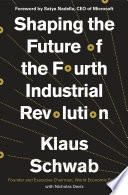

The Fourth Industrial Revolution (4IR) represents a fundamental change in the way we live, work, and relate to one another. It is characterized by a range of new technologies that blur the lines between the physical, digital, and biological worlds. These include advancements in artificial intelligence (AI), robotics, the Internet of Things (IoT), genetic engineering, quantum computing, and more. This idea emphasizes the significance of recognizing how these technologies interact and the potential they hold for transforming industries and societies. The book discusses the implications of 4IR on various sectors, including manufacturing, healthcare, and education, highlighting both opportunities and challenges. It stresses the importance of adapting to these changes to harness their benefits effectively.
Continue readingAs technologies evolve, the need for effective governance and policy frameworks becomes paramount. This idea explores how governments and organizations can create policies that foster innovation while ensuring ethical standards and social responsibility. The authors argue that without proper governance, the benefits of 4IR may not be equitably distributed, leading to increased inequality and social unrest. They discuss the importance of multi-stakeholder engagement in shaping policies that are inclusive and forward-thinking. This includes the collaboration between governments, businesses, civil society, and academia to create a regulatory environment that promotes innovation while protecting public interests.
Continue readingThe book emphasizes the necessity of a human-centric approach to technology in the context of 4IR. This idea posits that technology should enhance human capabilities and improve quality of life rather than replace human jobs or diminish human agency. The authors advocate for designing technologies that consider ethical implications and prioritize human welfare. This includes addressing concerns related to privacy, security, and the psychological impacts of technology. By fostering a human-centric design philosophy, organizations can create solutions that not only drive economic growth but also enhance societal well-being.
Continue readingWith the rapid pace of technological advancement, there is a growing demand for new skills and competencies. The book highlights the critical role of education and lifelong learning in preparing individuals for the future workforce. It discusses the need for educational institutions to adapt their curricula to include digital literacy, critical thinking, and problem-solving skills. Moreover, the authors emphasize the importance of reskilling and upskilling existing workers to meet the demands of a changing job market. This idea underscores the need for collaboration between educational institutions, businesses, and governments to create training programs that align with the future needs of the economy.
Continue readingInnovation is at the heart of the Fourth Industrial Revolution, and the book discusses how entrepreneurship can drive this innovation. It explores how startups and established companies can leverage new technologies to create disruptive products and services. The authors highlight case studies of successful entrepreneurial ventures that have harnessed 4IR technologies to solve complex problems and meet emerging market needs. This idea encourages a culture of experimentation and risk-taking, suggesting that fostering an entrepreneurial mindset is essential for navigating the uncertainties of the future.
Continue readingThe book addresses the pressing need for sustainability in the face of rapid technological advancement. It argues that 4IR presents an opportunity to rethink our approach to environmental challenges and resource management. The authors discuss how technologies such as AI and IoT can be utilized to optimize energy consumption, reduce waste, and promote sustainable practices across industries. This idea emphasizes the importance of integrating sustainability into business strategies and innovation processes, advocating for a shift towards a circular economy that minimizes environmental impact while maximizing resource efficiency.
Continue readingIn an increasingly interconnected world, the book highlights the significance of global collaboration in shaping the future of 4IR. This idea posits that addressing global challenges such as climate change, inequality, and health crises requires collective action and shared knowledge. The authors discuss the role of international organizations, partnerships, and networks in fostering collaboration among nations, businesses, and communities. By promoting cross-border cooperation and knowledge exchange, stakeholders can leverage the strengths of diverse perspectives to create innovative solutions that benefit humanity as a whole.
Continue readingThe reading time for Shaping the Future of the Fourth Industrial Revolution depends on the reader's pace. However, this concise book summary covers the 7 key ideas from Shaping the Future of the Fourth Industrial Revolution, allowing you to quickly understand the main concepts, insights, and practical applications in around 25 min.
Shaping the Future of the Fourth Industrial Revolution is definitely worth reading. The book covers essential topics including Understanding the Fourth Industrial Revolution, The Role of Governance and Policy, Human-Centric Approach to Technology, providing practical insights and actionable advice. Whether you read the full book or our concise summary, Shaping the Future of the Fourth Industrial Revolution delivers valuable knowledge that can help you improve your understanding and apply these concepts in your personal or professional life.
Shaping the Future of the Fourth Industrial Revolution was written by Klaus Schwab, Nicholas Davis.
If you enjoyed Shaping the Future of the Fourth Industrial Revolution by Klaus Schwab, Nicholas Davis and want to explore similar topics or deepen your understanding, we highly recommend these related book summaries:
These books cover related themes, complementary concepts, and will help you build upon the knowledge gained from Shaping the Future of the Fourth Industrial Revolution. Each of these summaries provides concise insights that can further enhance your understanding and practical application of the ideas presented in Shaping the Future of the Fourth Industrial Revolution.